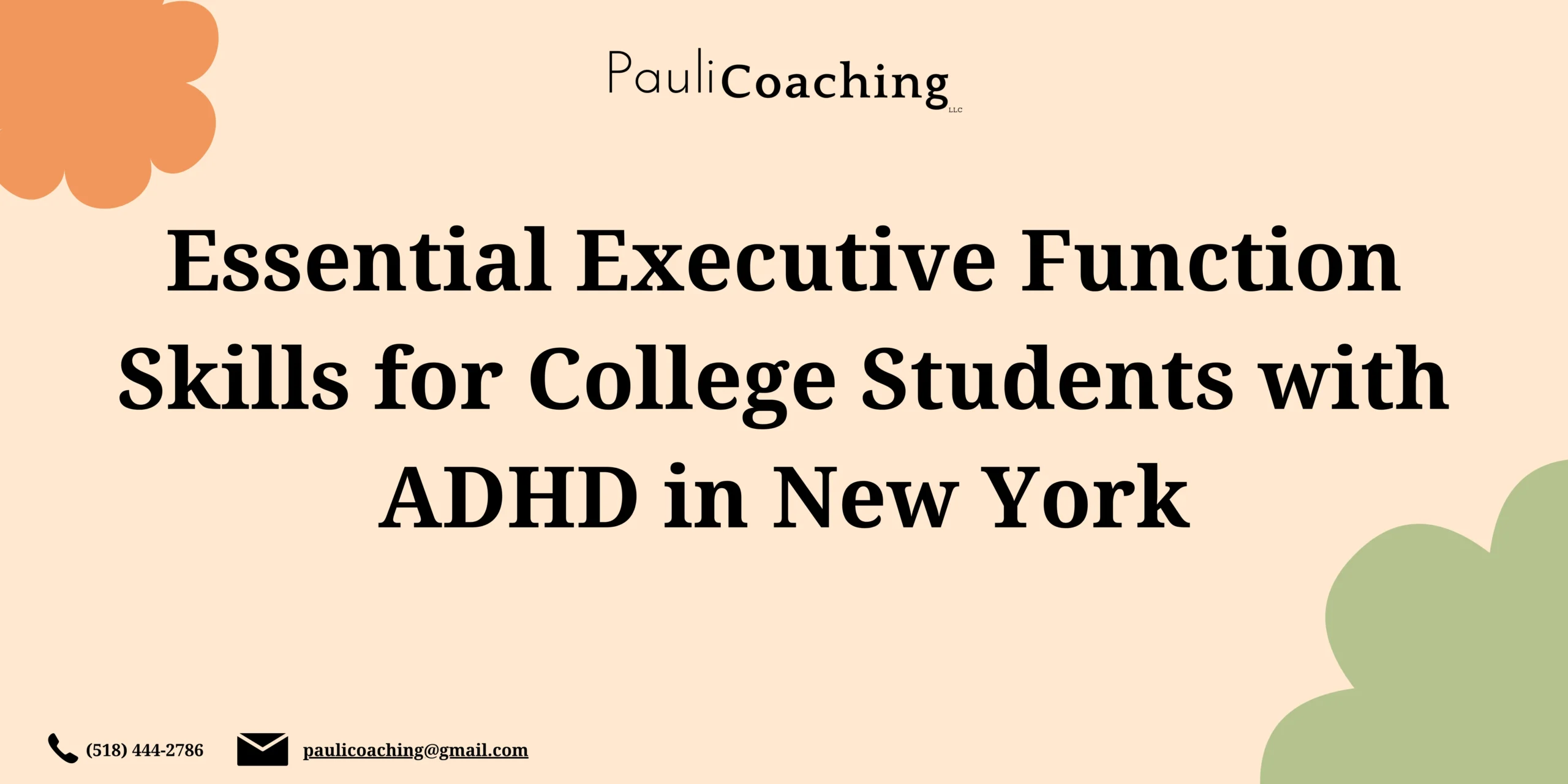College is often seen as an exciting chapter for students, but it can be overwhelming, especially for those managing ADHD. From keeping up with coursework to adjusting to new social dynamics, the college environment demands strong executive function skills—a set of mental skills that include planning, time management, and organization. For college students with ADHD, developing these skills is key to thriving academically and personally.
Why Executive Function Skills Matter in College
Executive function skills are critical for managing everyday college tasks such as studying, meeting deadlines, and balancing academics with social life. However, ADHD can make it harder for students to:
- Stay organized
- Prioritize tasks
- Manage time effectively
These challenges can impact both grades and overall well-being. But with tailored coaching and the right strategies, students can strengthen their executive function and thrive in college.
Understanding ADHD in College Students
ADHD doesn’t disappear in adulthood—it often presents unique challenges in the college setting. The transition to college usually comes with more independence but also greater responsibilities. Without structured support, students may struggle with:
- Forgetting deadlines
- Difficulty focusing during lectures
- Procrastination
However, learning executive function skills for ADHD can help students overcome these challenges and succeed both academically and socially.
Key Executive Function Skills for College Success
1. Time Management
Effective time management is the foundation of college success. ADHD can make it tough to gauge how long tasks will take, leading to last-minute cramming or unfinished assignments. Here’s how to manage time more effectively:
- Use a planner or digital calendar to organize class schedules, assignment deadlines, and study sessions.
- Break larger tasks into smaller steps, setting mini-deadlines for each part.
Setting clear timelines reduces procrastination and helps students manage their workload more efficiently.
2. Task Prioritization
College students with ADHD may find it difficult to decide which tasks are most urgent or important. This can lead to spending too much time on low-priority activities. To improve task prioritization:
- Create a daily to-do list and label tasks as “High,” “Medium,” or “Low” priority.
- Tackle high-priority tasks first, followed by medium-priority ones.
This approach ensures that students focus on critical tasks first, reducing the likelihood of missing important deadlines.
3. Organizational Skills
Staying organized in college can be a major challenge for students with ADHD. From keeping track of lecture notes to managing study materials, the key is to establish effective systems:
- Use digital tools like note-taking apps, cloud storage, and organization apps.
- Set up a consistent study environment with all necessary supplies within reach.
By developing stronger organizational skills, students can reduce stress and increase productivity.
4. Focus and Attention
ADHD can make it challenging to maintain focus during long lectures or study sessions. Here are a few strategies to boost focus:
- Use the Pomodoro Technique, which involves 25-minute focused study sessions followed by a 5-minute break.
- Eliminate distractions by using apps like Focus@Will or website blockers during study time.
Improving focus not only enhances academic performance but also builds confidence in students’ abilities to handle college tasks effectively.
5. Self-Motivation and Accountability
Maintaining motivation in college can be tough for students with ADHD. Without external reminders, it’s easy to lose track of deadlines or feel discouraged. To boost motivation:
- Set short-term goals, such as completing a specific number of pages in a textbook or drafting part of an essay.
- Use positive reinforcement by rewarding yourself after achieving each goal, such as taking a short walk or watching an episode of your favorite show.
Working with a coach can help students stay accountable and motivated.
How Executive Function Coaching Helps College Students with ADHD
1. Personalized Strategies
Coaching provides personalized strategies based on each student’s unique strengths and weaknesses. Coaches assess where students need the most support, whether it’s time management, organization, or self-advocacy, and tailor the approach accordingly.
2. Regular Check-Ins
Consistency is key to building new habits. Coaches schedule regular check-ins to review progress, discuss challenges, and adjust strategies as needed. This ensures that students remain on track and continuously improve their executive function skills.
3. Building Confidence Through Positive Reinforcement
Behavioral science shows that positive reinforcement is highly effective in creating lasting behavior changes. Coaches use positive reinforcement to celebrate small achievements, which encourages students to maintain their efforts and stay motivated.
Real-Life Success Stories: How Executive Function Coaching Works
Meet Alex, a sophomore at a New York college who struggled with ADHD. He often missed assignment deadlines, lost focus during lectures, and felt overwhelmed by his workload. After starting executive function coaching, Alex learned how to break tasks into smaller parts, set clear priorities, and use digital tools for organization. By the end of the semester, his grades improved, and he felt more in control of his schedule.
Tips for Parents: How to Support Your College Student with ADHD
Parents can play a key role in supporting their college-aged children’s executive function skills. Here are some tips:
1. Encourage Consistent Routines
While college students often have varying schedules, encourage them to establish a consistent routine for studying, sleeping, and self-care. Consistency builds habits and reduces anxiety.
2. Offer Emotional Support
College can be stressful, especially for students managing ADHD. Offer emotional support by being a sounding board, showing empathy, and reminding them of their strengths.
3. Promote Self-Advocacy
Encourage your student to communicate their needs to professors or seek campus resources. Learning to advocate for themselves is a critical skill that will serve them throughout college and beyond.
How to Get Started with Executive Function Coaching
If your college student is struggling with ADHD, it might be time to consider coaching.
What to Expect from the First Coaching Session
- Initial Assessment: Coaches identify areas of strength and challenge.
- Goal Setting: Students and coaches set realistic, achievable goals together.
- Ongoing Support: Regular sessions ensure continuous progress and accountability.
Succeeding in College with ADHD
Developing executive function skills for ADHD is crucial for college students aiming to thrive academically and personally. By improving time management, organization, and focus, students can reduce stress and boost their confidence.
If you’re ready to help your college student succeed, contact Pauli Coaching today to learn more about our coaching programs.


